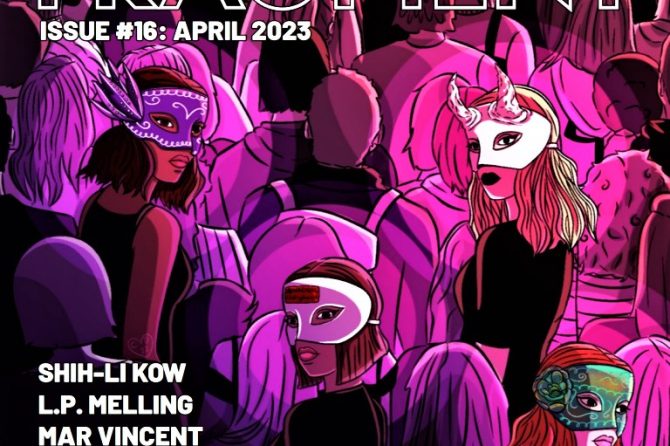 In January 2015, Clarkesworld Magazine published its 100th issue. The memorial issue features a number of wonderful stories and articles, but what excites the Chinese fandom most is the two stories and one interview from China: Tang Fei’s A Universal Elegy translated by John Chu, Zhang Ran’s Ether translated by Carmen Yiling Yan and Ken Liu and Exploring the Frontier: A Conversation with Xia Jia by Ken Liu. This is the best New Year gift for Chinese fans, as well as for the English readers.
In January 2015, Clarkesworld Magazine published its 100th issue. The memorial issue features a number of wonderful stories and articles, but what excites the Chinese fandom most is the two stories and one interview from China: Tang Fei’s A Universal Elegy translated by John Chu, Zhang Ran’s Ether translated by Carmen Yiling Yan and Ken Liu and Exploring the Frontier: A Conversation with Xia Jia by Ken Liu. This is the best New Year gift for Chinese fans, as well as for the English readers.
Zhang Ran is one of the brightest uprising stars in Chinese science fiction spectrum in recent years. Ether is actually his first published science fiction story and won him both Galaxy Award and Chinese Nebula Award – two highest awards for Chinese science fiction.
Ether was first published in Chinese in Science Fiction World Magazine in September, 2012.
In a dystopian near future, the protagonist, a middle-aged man doing an insignificant job for government 12 hours per week, found the world turning boring, no bold discussions, no distinctive opinions, no passion. One day, he came across with a mysterious lady and joined the finger-talking group, in which he found the sharp ideas transmitting secretly. By attending the finger-talking gathering, he picked up the courage and vigor in youth and approached the truth.
 The author uses a lot of details and memory flash-backs to illustrate the protagonist’s personality and explain how it is cultivated so. Unlike some other science fiction stories which focus a lot on the technology, Ether has a special focus on the protagonist’s self-rediscovery. Written in the first-person narration, the story has a strong sense of substitution. Readers follow the protagonist’s perspective into the world he lives in as well as his own inner world. All these add to the literariness of the story.
The author uses a lot of details and memory flash-backs to illustrate the protagonist’s personality and explain how it is cultivated so. Unlike some other science fiction stories which focus a lot on the technology, Ether has a special focus on the protagonist’s self-rediscovery. Written in the first-person narration, the story has a strong sense of substitution. Readers follow the protagonist’s perspective into the world he lives in as well as his own inner world. All these add to the literariness of the story.
The pace of the story is slow and the tone is plain in the beginning, indicating the spiritless society, but as the story processes, vitality and enthusiasm appear. The author is a grand master of fostering atmosphere and arousing readers’ emotions, in a calm and controlled way. The translation delivers the original keynote quite well.
Interestingly, no Chinese elements can be found in the story. If the author and translators’ names are covered, maybe you won’t even notice that this is a story written by a Chinese. (Again, Ken Liu and Carmen Yiling Yan has done a great job!) The protagonist drinks whisky, smokes cigar, eats chicken and sandwich. He lived in a farm when he was young. The taxi driver asks for tips. The girls are blonde or blue-eyed. Even the language itself has a subtle feeling of translationese. (Well, you cannot feel it if you do not read Chinese.) What I want to emphasize here is that the westernization style is not an adjustment made by the translators, but originally meant by the author himself.
It is easy for the Chinese readers to associate some settings in the story with the reality in our own country. I asked Zhang Ran whether he avoided the Chinese elements in order to avoid alluding China. As you may know, there is strong publication censorship in China. It is quite difficult for political-sensitive stories to be published. Ether was finished in 2011 and it took a year for it to be successfully published due to the political-sensitiveness. Zhang Ran regards taboo as quite a subtle theme in Chinese culture. He said that sometimes Chinese writers avoid writing stories in a Chinese setting not only because of political censorship but also out of compromise to the current cultural atmosphere. This is a phenomenon not rare in the past, neither in the future.
Actually, the story setting is in America, though American readers may find it not so American. The president, the federal government and the diverse population may remind you of the States, but the States from a foreigner’s perspective. Ether belongs to the series “The Gloomy States”, in which countries break into independent states due to a technology exploration. Different states hold different technologies, controlled by different enterprises. It is naturally for this to happen in the United States of America. The City of Rising Winds, another story belonging to the same series, won him another Galaxy. Both Ether and The City of Rising Winds happened before the technology exploration. We can expect more interesting stories in “The Gloomy States” in the future.
 I also noticed some interesting details when rereading the story again in English and consulted the author about them.
I also noticed some interesting details when rereading the story again in English and consulted the author about them.
One thing is that if the story happens in America, the finger-talking should use Latin letters rather than Chinese characters. However, I would imagine Chinese characters, each independent symbol, more recognizable than English words composed of Latin letters. Zhang Ran told me that he imagined using Latin letters in finger-talking when writing the story but admitted that he also found it difficult to recognize after trying. Anyway, both Zhang Ran and I command Chinese characters much better than English words. Maybe English native speakers can have a try and judge the degree of difficulty of finger-talking.
Another thing is the Steve Jobs hoodie. From the story, we know that Steve Jobs was “as good as a religious leader” when the protagonist was young and became unknown when the story happened. So I would guess that the story happened around 20 years after. Zhang Ran told me that the protagonist had a Steve Jobs hoodie because he himself had one, so the story happened in a near future when the author himself grew old. He emphasized that in our generation, there was religious belief in Steve Jobs.
Zhang Ran was born in 1981 in Taiyuan, Shanxi province, an ancient capital in China. He studied computer science and worked as a journalist after graduation. Now he is a freelance writer and lives in the southern part of China with his wife.
He is a big surprise for Chinese science fiction. No one had heard of him before Ether was published. After quitting the job and moving to the south, he had enough spare time for writing. He wrote a story and it happened to be a science fiction story, so he gave it to Science Fiction World Magazine. The debut won him attention and support in a single night. Since then on, Zhang Ran started his career as a science fiction writer.
Apart from “The Gloomy States” series, which have a western background, Zhang Ran also has stories in Chinese background. Snow Drifts in Jinyang, which won him a silver award for Chinese Nebula in 2014, is a historical steampunk story in Jinyang, the ancient name of Taiyuan, his hometown. This particular story is considered the author’s own favorite because he was able to deliberate words and sentences when writing this ancient Chinese style story.
Zhang Ran’s stories are of high literature quality, distinguishing them from others. He loves Rock and Roll, which can also be observed from Ether. Fans regard him cool and artistic. The Chinese readers are looking forward more of his stories and I am sure that more of them will be translated into English.
Here are two pictures provided by Zhang Ran.










